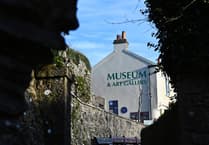A claim a last-minute use of reserves was used to lower Pembrokeshire’s council tax increase to avoid senior councillors being defeated during the setting of the council’s annual budget is to come under the spotlight later week.
Pembrokeshire County Council was facing a 16.3 per cent council tax increase when setting the council budget for 2024-’25 in March; that figure dropping to 12.5 per cent after an 11th-hour alternative budget proposal by deputy leader Cllr Paul Miller was narrowly backed.
That drop in the council tax rise was made by using additional reserves of £1.5m, as well as £1m target for council efficiency savings.
Members of the council’s Governance & Audit Committee are, at its April 18 meeting, to consider concerns raised by Councillor Huw Murphy about the budget process following that meeting, along with assurances provided responding to his concerns.
A report for members states: “On March 25 Councillor Murphy raised concerns to the Chair of the Governance & Audit Committee regarding the council’s budget setting process for the 2024-25 budget, and associated issues, which council considered and set at their meeting on March 7.
“The Chair of the Governance & Audit Committee asked the Chief Executive to review those concerns and report to the Committee to provide assurance that there were no procedural failures in the budget setting process.”
Cllr Murphy has written: “An email was sent out on behalf of the Director of Resources on Feb 1 making it clear that no alternative/amendment budget could be presented after Feb 14. However, on March 7 at full council this is exactly what occurred.”
He has raised concerns about why an alternative budget proposal was allowed after February 14, and has asked whether there was sufficient time for the accepted alternative budget to be analysed.
He says his political group advanced a potential budget alternative to use £750,000 in reserve, which was refused, with a maximum of £375,000 offered, along with a later proposal refused, claiming Cllr Miller’s £1.5m proposal may have been submitted just 18 hours before the budget D-day.
In his lengthy document raising his concerns he states: “I am also aware that some ruling group councillors arrived at County Hall very early on March 7 to possibly refine the amendment that was then put before council.
“I form my opinion on becoming aware of a councillor having been contacted repeatedly in an effort to ‘persuade’ him in the weeks before full council to support a council tax of 16.31 per cent who was contacted on two to three occasions on the morning of March 6 and bravely refused to relent and made it clear he could not support a CT of higher than around 12 per cent.
“This councillor is in the ruling group and, in my opinion, his refusal and the refusal of others on the ruling group to buckle to a CT rise of 16.31 per cent caused panic in a Cabinet now facing imminent defeat at full council the next day and as a result they drafted a last-minute alternative/amended budget to appease ruling group councillors who had rebelled.”
The report for members concludes: “There is no evidence of procedural failings in the budget setting process and the legal budget setting procedures have been adhered to. There was sufficient time for officers to properly assess the alternative budget proposed and for the S151 Officer to make a properly informed statement at Council on March 7.”
It is recommended members consider the concerns raised by Cllr Murphy and notes the assurance provided in response to those concerns, and the committee notes that there were no procedural failures in the council’s budget setting process.




